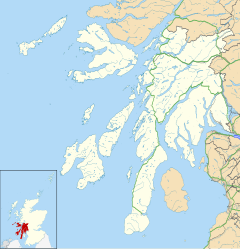Hunters Quay
Hunters Quay
|
|
|---|---|
 A view of the Holy Loch, looking towards Kilmun. |
|
| Hunters Quay shown within Argyll and Bute | |
| OS grid reference | NS175796 |
| Council area | |
| Country | Scotland |
| Sovereign state | United Kingdom |
| Post town | DUNOON, ARGYLL |
| Postcode district | PA23 |
| Dialling code | 01369 |
| EU Parliament | Scotland |
| UK Parliament | |
| Scottish Parliament | |
National grid reference NS1839679130
Hunters Quay (Scottish Gaelic: Camas Rainich) is a village, on the Cowal Peninsula in Argyll and Bute, Scottish Highlands. Situated between Kirn to the south and Ardnadam to the north, Hunters Quay is the main base of Western Ferries, operating between Hunters Quay and McInroy's Point.
It is home to the Royal Marine Hotel, which is over one hundred years old.
The 12-metre class yacht race in the 1908 London Olympic Games took place at Hunters Quay. Most of the sailing took place on the Solent, but only two boats entered the 12-metre class: Mouchette from the Royal Liverpool Yacht Club and Hera from the Royal Clyde Yacht Club. They were allowed to race on the Clyde for convenience. The course was twice round a 13-mile lap of the Clyde, starting and finishing at Hunters Quay. Thomas C. Glen-Coats' Hera won.
"Jim Crow" (earlier "The Jim Crow"), a pointed rock lying horizontally on the beach, was known as the "Jim Crow Stone" in the 1880s, and by 1904 was painted with a face. The inspiration behind the name and design have been suggested to be: the Jump Jim Crow song and dance popularised by the American minstrel show performer Thomas D. Rice; local stories suggest it could have been the name of the owner of a nearby builders’/joiners yard; a jackdaw [which has a black beak but not a red mouth]; or the Jim Crow laws which were state and local laws enforcing racial segregation in the Southern United States. Due to this potential link the rock has been painted over a number of times, but always returned to its original state. Another is that it is named after the line "So they canonized him by the name of Jem Crow!" in the poem The Jackdaw of Rheims.
...
Wikipedia

